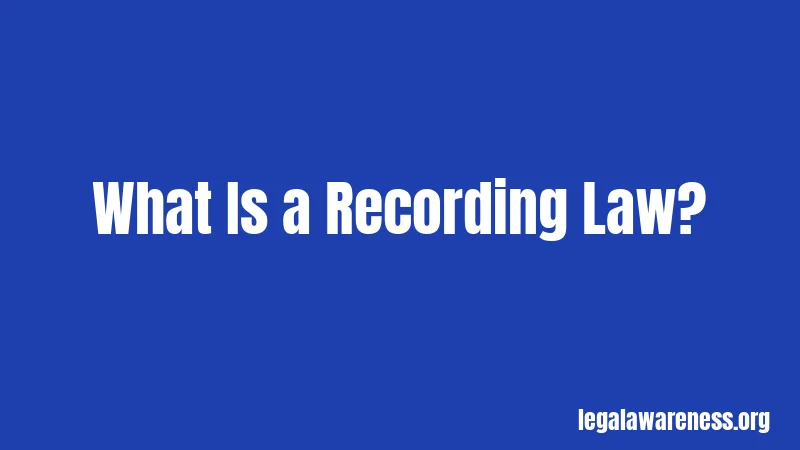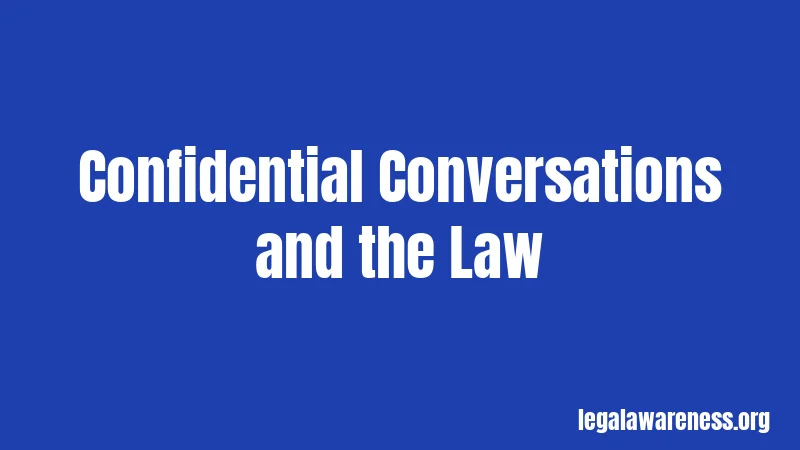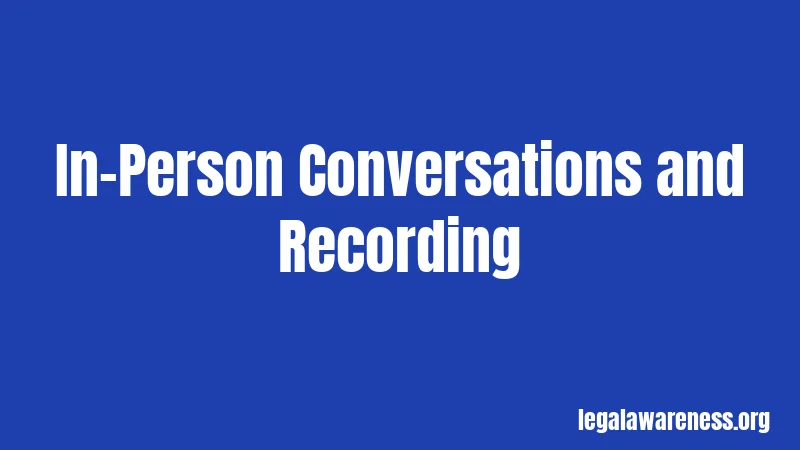New York Recording Laws (2026): What You Can and Can’t Record
Most people have no idea how strict recording laws are in New York. Seriously. You might think you can record someone anytime. But in New York, there are serious rules about who you can record and when. Get it wrong, and you could face real penalties.
Let’s break down exactly what you need to know about recording laws in New York.
What Is a Recording Law?

Recording laws control when you can legally capture someone’s voice or image. They protect people’s privacy. They also affect what you can do with recordings once you have them.
Think of it like this: just because you can hear someone doesn’t mean you can record them. And just because you can record them doesn’t mean you can share that recording. Two very different things, right?
New York has specific rules. Following them keeps you safe legally. Breaking them can cost you money and more.
The Two-Party Consent Rule: New York’s Biggest Recording Law
Okay, here’s the most important thing to understand. New York is a “two-party consent” state for phone calls and confidential conversations.
What does that mean? Both people in a conversation must agree to being recorded. If you record someone without their permission, you’re breaking the law. It doesn’t matter if you’re part of the conversation or not.
Let me break this down more clearly. Say you’re on a phone call. You can’t secretly record it without telling the other person first. Even if you’re having the conversation, they still have to know you’re recording. They have to agree to it. Yep, that’s the rule.
This is different from some states. In those “one-party” states, you only need your own permission to record. Not New York. Here, everyone involved needs to consent.
Confidential Conversations and the Law

Not all conversations are “confidential” in the legal sense. That’s an important detail.
A confidential conversation is one where a person has a reasonable expectation of privacy. Phone calls? Confidential. Conversations in private spaces? Confidential. Whispered conversations at a party? Probably confidential.
But conversations in public places might be different. If you’re talking loudly in a coffee shop, people around you know they might be overheard. The expectation of privacy is lower.
Here’s where it gets tricky, honestly. Even public conversations have some protection under New York law. Recording someone without consent in almost any situation is risky in New York. The safest approach? Always ask permission first.
Recording Phone Calls: The Rules
Phone calls get special protection in New York. This is serious stuff.
Under New York’s law, you cannot record a phone call without the other person’s permission. Not even a little bit. Not even if you think they won’t care. This applies to regular calls, video calls, and any phone conversation.
Want to record a call? Tell the person first. Get their permission. That’s it. Simple, but really important.
Wondering if this applies to you? It applies to everyone. If you’re in New York and making a call to anyone, anywhere, you need the other person’s consent to record. Even if they’re calling from out of state.
The penalties for illegal phone recording are serious. We’ll get to those in a minute. But first, understand this: phone recording violations are treated as criminal offenses in New York.
In-Person Conversations and Recording

Recording someone face-to-face without permission is also illegal in New York.
You’re at a meeting. You want to record it for your notes. You still need everyone’s permission. You can’t just hit record on your phone without telling people.
What about recording in a public place? Like a store or street? It gets complicated. You might be able to record video in public. But audio recording? You still need consent in most situations.
This part can be tricky, honestly. The exact rules depend on whether the location is private or public. Whether the conversation is confidential. Whether there’s a reasonable expectation of privacy.
Don’t worry, we’ll clear this up. Here’s the basic rule: unless you’re certain you have consent, don’t record someone without asking first. That simple approach keeps you safe.
Public Recording: What About Video and Photography?
Okay, pause. Read this carefully. Recording video or taking photos gets different treatment than audio recording.
You generally have more freedom to record video in public spaces. You can film people in public without their permission. You can photograph them too. Public places include streets, parks, and stores where you have permission to be.
But there’s a limit. You cannot record video in places where people have a reasonable expectation of privacy. Bathrooms. Private homes. Changing rooms. Hospital rooms. Anywhere private is off limits.
And here’s an important detail: just because you can record video doesn’t mean you can record the audio without consent. You might film someone in public legally. But if they’re talking, recording their voice without permission is still illegal.
Make sense, right? Video in public is usually okay. But adding audio changes things. The audio part is what gets restricted in New York.
The One Exception: Your Own Conversation
You have one major exception to the two-party consent rule.
If you’re part of a conversation, you can record it without everyone else’s permission. Wait, that sounds good, right? Not quite.
Actually, even this rule has limits in New York. Courts have said that recording your own conversation is generally legal. But you cannot record conversations where you’re pretending to be someone else. You cannot use deception to get someone to talk.
Here’s a real situation: you’re arguing with your boss on the phone. Legally, you might be able to record it. But some workplace agreements might prohibit it. You could face other consequences even if the recording itself is legal.
This is where things get nuanced. The rule exists. But other laws and rules can still apply.
Recording in Workplaces
Workplaces have their own recording rules on top of New York law.
Your employer can have policies about recording. They might say you cannot record conversations without permission. Or record meetings. Or record other employees. These policies are often legal and binding.
You could be breaking both New York law AND your work agreement. That’s double trouble.
If you’re thinking about recording at work, read your employee handbook first. Ask your HR department. Get permission in writing. Don’t take chances here.
Many workplaces require consent for all recordings. Some prohibit recording entirely. Know your specific workplace rules before you record anything.
Recording in Schools and Educational Settings
Schools have special rules about recording.
Teachers and school officials can usually record students for educational purposes. But students cannot secretly record teachers or other students.
Parents recording at school events? It gets complicated. You might be able to film a school play. But you might not be able to record conversations with teachers or administrators without permission.
Each school has its own policies too. They can restrict recording even beyond what New York law requires. Check your school’s handbook.
Parents and students, here’s what matters: always ask before recording anything at school. Better safe than sorry.
Recording Police: What Are Your Rights?
Here’s an interesting one. Can you record police officers?
You generally have the right to record police in public. This is protected speech in many situations. You can film or photograph police making arrests or doing their job in public.
But audio recording of police conversations is trickier. If an officer is talking to you, recording without their permission violates the two-party consent rule. You need their consent to record that audio.
This creates a gray area. You might be able to film video with audio if you’re in public. But stopping a recording specifically to get an officer’s consent is reasonable. Courts expect this.
Best practice? Let officers know you’re recording. Say it clearly. “I’m recording this for my safety.” No deception. No hidden recording. Just clear consent.
Penalties for Illegal Recording in New York
Let’s get serious about consequences.
Illegal recording in New York is a crime. Specifically, it’s classified under Penal Code Section 250.00. This is the “eavesdropping” law.
First-time violations can result in criminal charges. You could face up to one year in jail. You could owe fines up to $500. Sometimes both.
Repeat violations are worse. Multiple violations can lead to more serious charges. Longer jail time. Higher fines. This escalates quickly.
Beyond criminal penalties, you could face civil lawsuits. The person you recorded could sue you for damages. They could win money from you. These civil cases often result in larger payments than criminal fines.
So what happens if you break this law? You could go to jail. You could pay hundreds or thousands of dollars. Your reputation could suffer. Employment opportunities could disappear. This is not a minor issue.
Recording Without Consent: Additional Legal Issues
Criminal charges are just the start.
If you record someone without consent and then share or distribute that recording, you face additional charges. Sharing illegal recordings is itself illegal.
You could face harassment charges. Wiretapping charges. Invasion of privacy lawsuits. These stack on top of each other.
The more people you share the recording with, the worse it gets. Posting to social media multiplies your exposure. You’re not just breaking the law once. You’re breaking it repeatedly with each share.
Courts take this seriously. Penalties increase with each violation. It gets expensive fast.
Consent: How to Get It Right
Getting consent is simple. It just requires clear communication.
Tell the person you want to record. Be specific about what you’re recording and why. Give them a chance to agree or refuse.
Written consent is best. Text message works. Email works. A simple “Can I record this phone call?” and their response is documentation.
For phone calls, you can say: “I’d like to record this conversation for my records. Is that okay?” Wait for them to agree before you hit record.
For in-person conversations, do the same. “I want to record this meeting. Everyone cool with that?” Get acknowledgment from all parties.
Document who consents and when. Keep this record in case questions come up later.
Recording in Public Spaces: The Details
Recording in public is mostly legal for video. But understanding the rules helps avoid problems.
You can film public events. Streets. Parks. Protests. People going about their day in public spaces.
You cannot film into private spaces. Windows of homes. Private businesses without permission. Areas marked as off-limits.
You cannot record people in vulnerable situations expecting privacy. People at medical facilities. Shelters. Private meetings in public spaces.
Audio recording is always the restriction. Even in public, recording conversations without consent violates New York law in most situations.
Basically, the rule is: video in public is usually fine. Audio of conversations requires consent always.
Recording Conversations at Home
What about your own home?
You can record conversations in your own home. Right? Not exactly.
If you live alone, you can record yourself. But if you live with others, it’s more complicated. Recording other people in your home without consent might violate their privacy rights.
If a guest comes over and you record them without permission, that’s illegal. Even in your own home.
If you’re married or in a relationship, recording your partner without consent is risky. It might violate the law. It definitely violates trust.
The safest approach is simple: get permission before recording anyone, anywhere.
Recording by Law Enforcement
Police can record you. But they have rules to follow.
Officers can record interviews and interrogations. They can film during arrests and traffic stops. This is generally legal and expected.
But even law enforcement must follow two-party consent rules in certain situations. If a detective records a private phone call, they need consent. They typically get warrants for this.
As a civilian, you’re not law enforcement. You cannot use their rules as justification for your recording.
Recent Changes to New York Recording Laws
New York’s recording laws have stayed relatively stable in recent years. The two-party consent rule remains firm.
However, technology has created new gray areas. Recording through apps. Hidden devices. Remote access recording. Courts continue to interpret laws as these technologies emerge.
One thing hasn’t changed: New York prioritizes privacy and consent. Laws lean toward protecting people’s expectation of privacy.
Stay informed about any updates. But for now, the rule is clear: get permission before recording anyone in a confidential conversation.
How to Record Legally in New York
Want to record something in New York? Here’s what you do.
First, determine if the conversation is confidential. Is it something where someone has a reasonable expectation of privacy? If yes, you need consent.
Second, identify all parties involved. Everyone participating in a conversation must consent.
Third, ask permission clearly. Explain what you’re recording and why. Get agreement from everyone.
Fourth, document the consent. Keep a record of who agreed and when.
Fifth, store the recording securely. Protect it from unauthorized access.
Sixth, don’t share without permission. Just because you can record something doesn’t mean you can share it.
This process protects you legally. It also respects people’s privacy.
Recording Services and Apps
Various apps let you record conversations. Automatic call recorders. Voice memo apps. Video recording software.
Using these apps in New York requires consent from everyone involved. The technology doesn’t change the law. Breaking the law with an app is still breaking the law.
Some services claim to handle consent automatically. They might send notices or play messages saying “this call is being recorded.” This can satisfy the consent requirement.
But some don’t. Using a hidden recorder or an app that doesn’t notify the other person is illegal in New York.
Check what your app does. Make sure it notifies parties that recording is happening.
Recording in Medical and Counseling Settings
Doctors, therapists, and counselors have strict privacy rules.
You cannot record conversations with medical professionals without explicit permission. HIPAA and New York law both protect these conversations.
Medical facilities can record you for security purposes. But they must notify you. Signs at entrances are common.
If you’re receiving treatment, your information is private. Recording it without permission violates multiple laws.
Patients generally cannot record conversations with healthcare providers without consent. Doing so can result in losing your doctor. Facing legal consequences. Both.
Recording During Legal Proceedings
What about court cases or legal meetings?
Courts control who can record in courtrooms. Generally, recording in court requires permission. Court rules vary by judge and court type.
Meetings with lawyers: you can usually record if you’re part of the conversation and have the lawyer’s permission. But the lawyer might have policies against it.
Legal depositions: again, permission is required. Usually, the attorneys involved decide whether recording is allowed.
Always ask before recording anything related to legal proceedings.
FAQ: Common Recording Questions
Can I record my spouse without permission? No. Even married people need consent to record each other. Recording without permission is illegal in New York, regardless of your relationship.
Is recording illegal if I’m part of the conversation? Generally, you can record a conversation you’re part of. But New York courts have limits. Deception invalidates this exception. Also, other laws might apply in specific situations.
What if someone is breaking a law? Can I secretly record them? No. You cannot use illegal recording to gather evidence of someone else’s crime. Two wrongs don’t make it legal. Let law enforcement handle it.
Can I record a public event or concert? Video recording at public events is usually okay if you have permission to be there. Audio recording might be restricted by the venue. Audio of conversations always requires consent.
What should I do if someone recorded me illegally? Document everything. Save any evidence. Report it to police if you want to press charges. Consult with a lawyer about civil action. You might have grounds for a lawsuit.
Final Thoughts
New York’s recording laws are strict. But they’re not complicated once you understand them.
The main rule: get permission before recording anyone in a confidential conversation. That covers almost everything.
For video in public: generally legal, but respect people’s privacy.
For phone calls: always get permission.
For private conversations: always get permission.
For recordings you make: control who accesses them.
The easiest approach? Just ask. “Can I record this?” It takes three seconds. It keeps you legal. It respects everyone involved.
Now you know the basics. Stay informed, stay safe, and when in doubt, look it up or ask a lawyer.
References
New York Penal Code Section 250.00: Eavesdropping
New York Department of State: Consumer Protection Bureau
Cornell Law School: New York Wiretapping and Eavesdropping Laws
